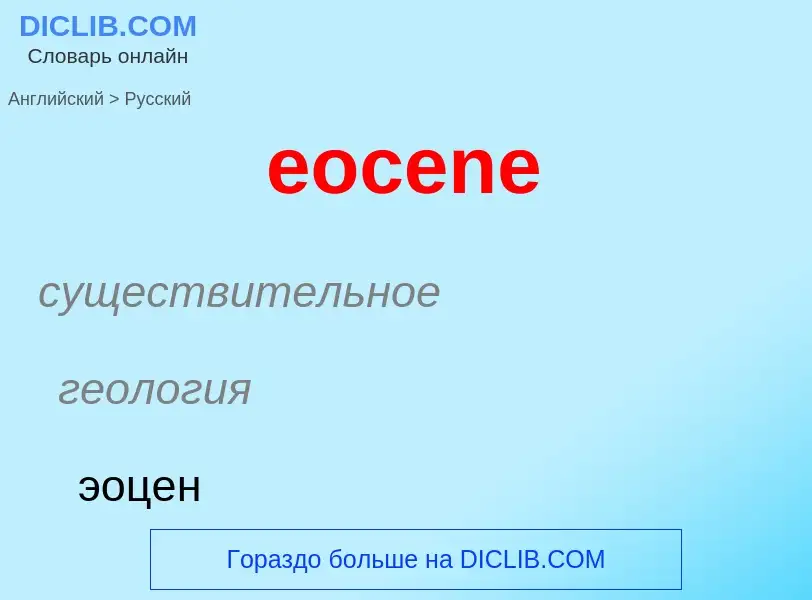Traducción y análisis de palabras por inteligencia artificial ChatGPT
En esta página puede obtener un análisis detallado de una palabra o frase, producido utilizando la mejor tecnología de inteligencia artificial hasta la fecha:
- cómo se usa la palabra
- frecuencia de uso
- se utiliza con más frecuencia en el habla oral o escrita
- opciones de traducción
- ejemplos de uso (varias frases con traducción)
- etimología
Eocene - traducción al ruso
существительное
геология
эоцен
['i:əusi:n]
прилагательное
геология
эоценовый
существительное
['i:əusi:n]
геология
эоцен
Definición
Wikipedia

The Eocene (IPA: EE-ə-seen, EE-oh-) Epoch is a geological epoch that lasted from about 56 to 33.9 million years ago (Ma). It is the second epoch of the Paleogene Period in the modern Cenozoic Era. The name Eocene comes from the Ancient Greek ἠώς (ēṓs, "dawn") and καινός (kainós, "new") and refers to the "dawn" of modern ('new') fauna that appeared during the epoch.
The Eocene spans the time from the end of the Paleocene Epoch to the beginning of the Oligocene Epoch. The start of the Eocene is marked by a brief period in which the concentration of the carbon isotope 13C in the atmosphere was exceptionally low in comparison with the more common isotope 12C. The end is set at a major extinction event called the Grande Coupure (the "Great Break" in continuity) or the Eocene–Oligocene extinction event, which may be related to the impact of one or more large bolides in Siberia and in what is now Chesapeake Bay. As with other geologic periods, the strata that define the start and end of the epoch are well identified, though their exact dates are slightly uncertain.


![French National Museum of Natural History]], [[Paris]] French National Museum of Natural History]], [[Paris]]](https://commons.wikimedia.org/wiki/Special:FilePath/Dinoceras mirabile Marsh MNHN.jpg?width=200)
![roller]] roller]]](https://commons.wikimedia.org/wiki/Special:FilePath/Primobucco.jpg?width=200)
![''[[Moeritherium]]'' ''[[Moeritherium]]''](https://commons.wikimedia.org/wiki/Special:FilePath/Moeritherium lyonsi (fossil mammal) (Eocene) (32167459460).jpg?width=200)
![''[[Hyracotherium]]'' ''[[Hyracotherium]]''](https://commons.wikimedia.org/wiki/Special:FilePath/Hyracotherium vasacciense (fossil horse) (Huerfano Formation, Lower Eocene; Huerfano Basin, Colorado, USA) 3 (32380466091).jpg?width=200)
![''[[Brontotherium]]'' ''[[Brontotherium]]''](https://commons.wikimedia.org/wiki/Special:FilePath/Brontotherium skull IMG 4441.jpg?width=200)
![''[[Basilosaurus]]'' ''[[Basilosaurus]]''](https://commons.wikimedia.org/wiki/Special:FilePath/Basilosaurus isis fossil, Nantes History Museum 03.jpg?width=200)
![''[[Andrewsarchus]]'' ''[[Andrewsarchus]]''](https://commons.wikimedia.org/wiki/Special:FilePath/Andrewsarchus mongoliensis.jpg?width=200)
![''[[Borealosuchus]]'' ''[[Borealosuchus]]''](https://commons.wikimedia.org/wiki/Special:FilePath/Borealosuchus wilsoni (15529256785).jpg?width=200)
![''[[Pakicetus]]'' ''[[Pakicetus]]''](https://commons.wikimedia.org/wiki/Special:FilePath/Pakicetus Canada.jpg?width=200)
![''[[Hyracodon]]'' ''[[Hyracodon]]''](https://commons.wikimedia.org/wiki/Special:FilePath/Hyracodon nebraskensis.jpg?width=200)

![''[[Peratherium]]'' ''[[Peratherium]]''](https://commons.wikimedia.org/wiki/Special:FilePath/Peratherium skull.jpg?width=200)
![''[[Hesperocyon]]'' ''[[Hesperocyon]]''](https://commons.wikimedia.org/wiki/Special:FilePath/Hesperocyon skull Smithsonian.jpg?width=200)
![''[[Tritemnodon]]'' ''[[Tritemnodon]]''](https://commons.wikimedia.org/wiki/Special:FilePath/Tritemnodon skull.jpg?width=200)
![''[[Coryphodon]]'' ''[[Coryphodon]]''](https://commons.wikimedia.org/wiki/Special:FilePath/Coryphodon skull.jpg?width=200)
![''[[Pseudocrypturus]]'' ''[[Pseudocrypturus]]''](https://commons.wikimedia.org/wiki/Special:FilePath/Pseudocrypturus Smithsonian fossil.jpg?width=200)
